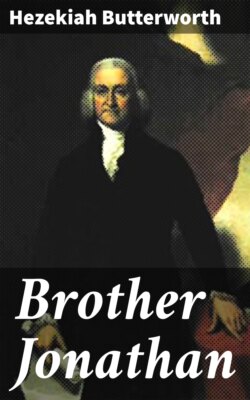Читать книгу Brother Jonathan - Hezekiah Butterworth - Страница 3
На сайте Литреса книга снята с продажи.
PREFACE
ОглавлениеTable of Contents
The writer has heretofore produced in the vein of fiction, after the manner of the Mühlbach interpretations, several books which were anecdotal narratives of the crises in the lives of public men. While they were fiction, they largely confided to the reader what was truth and what the conveyance of fiction for the sake of narrative form. It was the purpose of such a book to picture by folk-lore and local stories the early life of the man.
The folk-lore of a period usually interprets the man of the period in a very atmospheric way. Jonathan Trumbull, Washington’s “Brother Jonathan,” who had a part in helping to save the American army in nearly every crisis of the Revolutionary War, and who gave the popular name to the nation, led a remarkable life, and came to be held by Washington as “among the first of the patriots.” The book is a folk-lore narrative, with a thread of fiction, and seeks to picture a period that was decisive in American history, and the home and neighborhood of one of the most delightful characters that America has ever known—the Roger de Coverley of colonial life and American knighthood; very human, but very noble, always true; the fine old American gentleman—“Brother Jonathan.”
It has been said that a story of the life of Jonathan Trumbull would furnish material for pen-pictures of the most heroic episodes of the Revolutionary War, and bring to light much secret history of the times when Lebanon, Conn., was in a sense the hidden capital of the political and military councils that influenced the greatest events of the American struggle for liberty. The view is in part true, and a son of Governor Trumbull so felt that force of the situation that he painted the scenes of which he first gained a knowledge in his father’s farmhouse, beginning the work in that plain old home on the sanded floor.
From Governor Trumbull’s war office, which is still standing at Lebanon, went the post-riders whose secret messages determined some of the great events of the war. Thence went forth recruits for the army in times of peril, as from the forests; thence supplies for the army in famine, thence droves of cattle, through wilderness ways.
Governor Trumbull was the heart of every need in those terrible days of sacrifice.
His wife, Faith Trumbull, a descendant of the Pilgrim Pastor Robinson of Leyden, was a heroic woman to whom the Daughters of the Revolution should erect a monument. The picture which we present of her in the cloak of Rochambeau is historically true.
The eminent people who visited the secret town of the war during the great Revolutionary events were many, and their influence had decisive results.
Look at some of the names of these visitors: Washington, Lafayette, Samuel Adams, Putnam, Jefferson, Franklin, Sullivan, John Jay, Count Rochambeau, Admiral Tiernay, Duke of Lauzun, Marquis de Castellax, and the officers of Count Rochambeau and many others.
The post-riders from Governor Trumbull’s plain farmhouse on Lebanon Hill (called Lebanon from its cedars) represented the secret service of the war.
When the influence of this capital among the Connecticut hills became known, Governor Trumbull’s person was in danger. A secret and perhaps self-appointed guard watched the wilderness roads to his war office.
One of these, were he living, might interpret events of the hidden history of the struggle for liberty in a very dramatic way.
Such an interpreter for the purpose of historic fiction we have made in Dennis O’Hay, a jolly Irishman of a liberty-loving heart.
In a brief fiction for young people we can only illustrate how interesting a larger study of this subject of the secret service of the Revolution at this place might be made. We shall be glad if we can so interest the young reader in the topic as to lead him to follow it in solid historic reading in his maturer years.
Hezekiah Butterworth.
